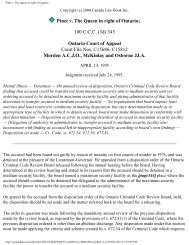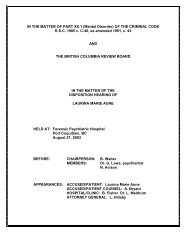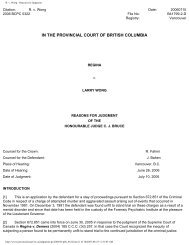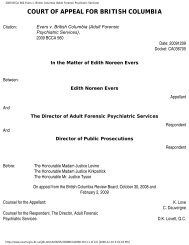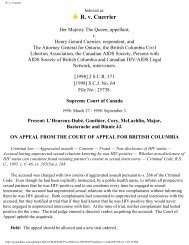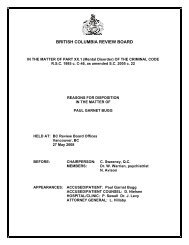R. v. CONWAY - British Columbia Review Board
R. v. CONWAY - British Columbia Review Board
R. v. CONWAY - British Columbia Review Board
Create successful ePaper yourself
Turn your PDF publications into a flip-book with our unique Google optimized e-Paper software.
information that was irrelevant, unreliable or inaccurate. Accordingly, the <strong>Board</strong> had the jurisdiction<br />
to exclude evidence and it therefore met the third Mills criterion. Major J. expressly disagreed with<br />
Sopinka J.’s conclusion that the doctrine of procedural fairness provided sufficient protection of<br />
constitutional rights in the context of the <strong>Board</strong>’s proceedings.<br />
[34] More recently, the Court has had two further opportunities to consider the Mills<br />
test. In Dunedin, the issue was whether a provincial court judge with jurisdiction under Ontario’s<br />
Provincial Offences Act, R.S.O. 1990, c. P.33, was a court of competent jurisdiction for the purpose<br />
of ordering costs against the Crown for failure to comply with the Charter. McLachlin C.J., writing<br />
for a unanimous Court, again confirmed that applying the Mills test is, first and foremost, a matter<br />
of discerning legislative intent. The question in each case is whether the legislature intended to give<br />
the court or tribunal the power to apply the Charter:<br />
[W]here a legislature confers on a court or tribunal a function that involves the<br />
determination of matters where Charter rights may be affected, and furnishes it with<br />
processes and powers capable of fairly and justly resolving those incidental Charter<br />
issues, then it must be inferred, in the absence of a contrary intention, that the legislature<br />
intended to empower the tribunal to apply the Charter. [para. 75]<br />
[35] This approach “promotes direct and early access to Charter remedies in forums<br />
competent to issue such relief” (para. 75). Applying it to the issue before her, McLachlin C.J.<br />
concluded that both the structure and function of the provincial offences court supported the view<br />
that it could and should apply the Charter. Looking first to function, McLachlin C.J. concluded that<br />
the provincial offences court’s role as a quasi-criminal court of first instance weighed strongly in<br />
favour of expansive remedial jurisdiction under s. 24 of the Charter. Such jurisdiction would<br />
promote the resolution of Charter issues in the forum best situated to resolve them:



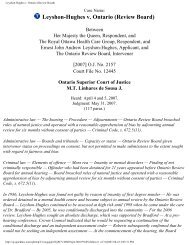
![LaFortune [LaFortunate] (Re) - British Columbia Review Board](https://img.yumpu.com/42779845/1/190x245/lafortune-lafortunate-re-british-columbia-review-board.jpg?quality=85)
